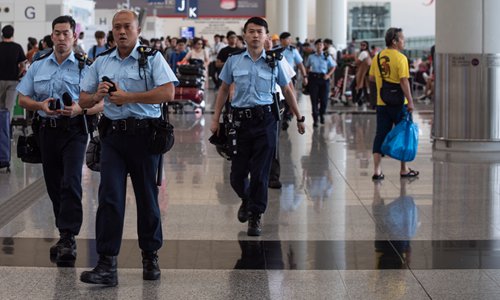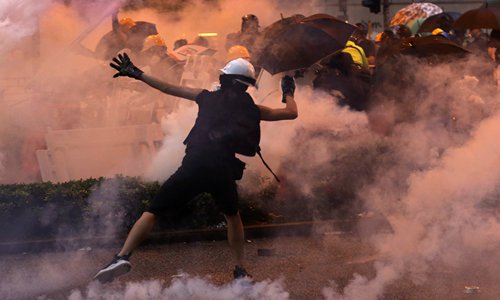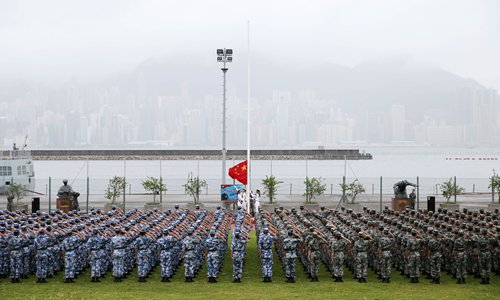Court’s release of arrested protest leaders deepens concerns of riots in Hong Kong

Police officers patrol the departure hall of Hong Kong International airport on August 14. Flights were departing the airport largely on schedule, a day after radical protesters caused chaos with a disruptive sit-in that paralyzed the international airport for two consecutive days. Photo: AFP
The release of two heads of secessionists in Hong Kong on Friday, hours after their arrestment the same day, had deepened concerns that a banned rally on Saturday could turn into extreme violence.
Saturday marks the fifth anniversary of the 831 Decision made by the National People's Congress.
On August 31, 2014, the National People's Congress stated that a 1,200 person nominating committee would pick two or three candidates, who would then be eligible to run in a general, one-person-one-vote election. But opposition groups attack this ruling for what they say obstructs democracy.
Organizers have said they canceled the rally, but many believe protests would still occur.
Opposition groups were urged not to take risks in chasing their ill-intentioned political purposes, as they would pay a heavy price for ruining the city.
The police arrested a number of key young activists on Thursday and Friday.
Joshua Wong Chi-fung, a Hong Kong activist and student leader of the Occupy Central Movement in 2014, was arrested Friday morning while walking to the South Horizons MTR station.
Agnes Chow Ting, a member of secessionist organization Demosisto, was also arrested.
The two followed the arrest of another secessionist, Andy Chan Ho-tin, who was detained at the Hong Kong International Airport Thursday night, according to his Facebook page.
Wong was arrested for allegedly inciting others to participate in unapproved assemblies while violently besieging police headquarters in June, and for organizing and participating in an unauthorized assembly. Chan was arrested for allegedly participating in riots and assaulting police. And Chow allegedly participated in an unapproved assembly and incited others to join. Police have detained them for further investigation.
Althea Suen Hiu-nam, former University of Hong Kong student union president, was likewise arrested on Friday in relation to the storming of the Legislative Council on July 1, media reported.
Police also arrested opposition party legislator Cheng Chung-tai Friday afternoon, media reported.
Police arrested them within two days before a scheduled march on Saturday, during which protesters and opposition forces plan to march from Central to the Liaison Office of the Central Government in Sai Ying Pun. Police believe that Saturday's march could lead to more violence, and thus objected to it.
Over the past two months, peaceful protests had turned violent, disrupting public order and endangering other people, a frontline officer told the Global Times on Friday.
"Although organizers said they canceled it, we believe people will still come out," he said, noting that the police will closely monitor how they act.
The officer said if violence erupts, the police will take proportionate action. Without a letter of non-objection, the so-called peaceful gathering will be illegal. As result, the police reserve the right to take further action if the situation gets out of control.
The police banned Saturday's rally as related intelligence showed that radical protesters may commit violence by using lethal weapons, including Molotov cocktails, corrosive liquid, tobacco pad and air force condor, Kwok Park-chung, regional commander of the police force on Hong Kong Island, told a routine press conference on Friday.
They may also use staple guns and rifles and make powder explosives. They may even use the aerial camera to attack people on the ground. The police would use proportionate force, Kwok noted.

A protester throws a tear gas grenade at police on Sunday. Protesters illegally changed their demonstration route, set up barriers to block main roads in Tsuen Wan and violently assaulted the police. After issuing warnings to the protesters several times, police deployed tear gas. Photo: Cui Meng/GT
Strict law enforcement
Police officers reiterated at a routine press conference on Friday that any participation in a prohibited assembly is illegal.
Kwok also noted during the press conference that residents who participate in banned assemblies will face a maximum of five years in prison, and urged Hongkongers to distance themselves from violent protesters.
"If illegal acts occur, the police will arrest the suspects and bring them to justice," Kwok said.
However, Wong and Chow were granted bail on Friday afternoon after they appeared in Eastern Court to face charges, including participating in unapproved assembly and inciting others to join, and both were given curfews of between 11 pm and 7 am and banned from entering the Admiralty area, according to local media reports.
Tian Feilong, an associate professor at Beihang University in Beijing and member of the Beijing-based Chinese Association of Hong Kong and Macao Studies, believes that Hong Kong judges, local or foreign, tend to show partiality for protesters involved in social movements while raising the bar for law enforcement bodies.
Such "double standards" are obvious during the current string of protests, noted Tian.
No matter how the judges of Hong Kong rule, the Hong Kong police will definitely enforce the law strictly and firmly, the frontline officer said. "Hong Kong police have been restrained. If the protesters attack police and damage public property, the police will step in and stop them," the frontline officer said.
As a way of protesting against police arrests, some opposition activists who support Wong and Chow claimed that the high-profile arrests before Saturday are a way for authorities to "spread white terror" to anti-government protesters.
"We arrested them based on sufficient evidence," the frontline officer said, noting that the police have been investigating cases related to violence during the months-long protests.
Zhi Zhenfeng, a legal expert at the Chinese Academy of Social Sciences in Beijing, told the Global Times that Hong Kong society has already questioned the politicization of Hong Kong's judicial system and believes that the system has been subject to ideology.
The rule of law cannot be fully implemented in such cases, Zhi noted.
"But several suspects granted bail in the past three months could make Hong Kong society believe that this is actually indulging illegal protests and even violence," Zhi said.
Well-known Hong Kong lawyer Kennedy Wong noted that this is not the first time that Wong and Chow committed offenses, and many of their "allies" have fled Hong Kong. The prosecutor, the justice department this time, should oppose bail and file an appeal.
Warnings sent out
Although Civil Human Rights Front convener Jimmy Sham said on Friday that the rally for Saturday was canceled after the police rejected the appeal, anti-government groups have been circulating new posters featuring "government and police brutality" over social networks such as Facebook, Telegram and LIHKG, urging more people to come out and protest.
The riots in Hong Kong also sparked speculation online over whether the central government will send the People's Armed Police, who have staged drills recently in neighboring Shenzhen, to support the Hong Kong police.
The People's Armed Police staged a new drill that featured an apparent large-scale anti-riot exercise in Shenzhen on Thursday.
Hundreds of armed officers took part in the drill, where they faced "rioters" holding long batons, according to a video widely circulated online. When riot police marched forward, the "rioters" continued to move forward, and some struck the officers with batons, the video showed. The officers then steadily moved forward equipped with shields and two water cannons. They began aiming at the "rioters" before spraying water at them.
A source close to the matter confirmed with the Global Times that it was an anti-riot drill staged Thursday at Shenzhen Bay Sports Center.
Within a few seconds, the officers placed the situation under control, and the "rioters" began retreating.
The drill mirrors the months-long protests in Hong Kong, as protesters threw petrol bombs and attacked the Hong Kong police with weapons, some internet users on the Chinese mainland said.
Mei Jianming, a counter-terrorism professor at the Shanghai University of Political Science and Law, told the Global Times that the Hong Kong police can take different measures for different groups.
"The police should crack down on extreme protesters. For moderates, they should try to win their support, and the general public should engage in dialogue. As for external forces, the police should restrict them."

People's Liberation Army (PLA) troops lead a flag-raising ceremony on Friday morning at the PLA's Hong Kong Garrison. This is the first such ceremony after the garrison conducted the 22nd rotation of its members in the early hours of Thursday since it began garrisoning Hong Kong in 1997. Photo: Xinhua
Meanwhile, the Hong Kong Garrison of the Chinese People's Liberation Army conducted the 22nd rotation of its members in the early hours of Thursday since it began garrisoning Hong Kong in 1997, the Xinhua News Agency reported. The move is a routine annual rotation in line with the Law of the People's Republic of China on Garrisoning the Hong Kong Special Administrative Region, which was approved by the Central Military Commission.
Hong Kong Chief Executive Carrie Lam Cheng Yuet-ngor posted a video on her official Facebook page to ask Hongkongers to cherish this home, which has now been experiencing social turbulence that had hurt the lives of every citizen.
"This home was built on the efforts of every Hongkonger. Treasure Hong Kong, our home," the video showed.
Newspaper headline: HK police vow to thwart violence